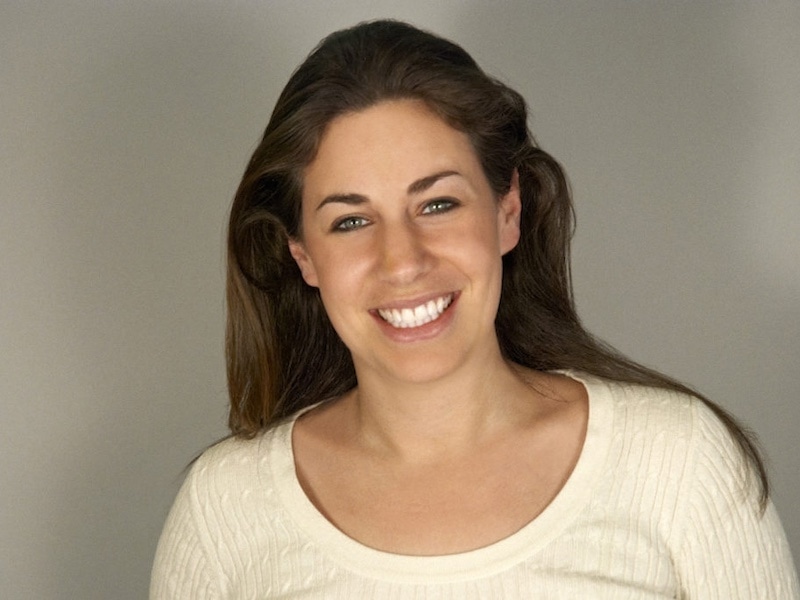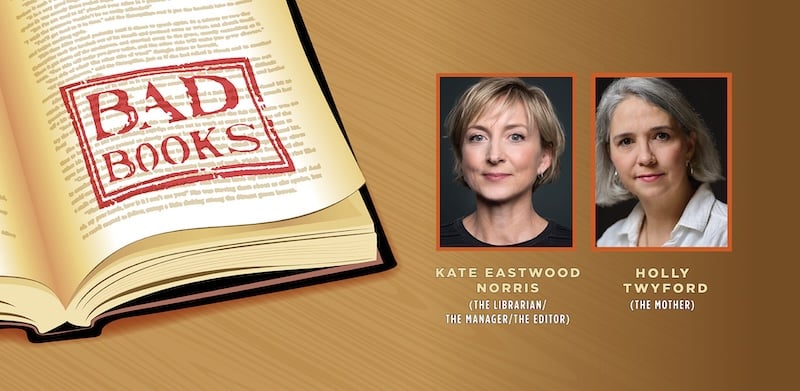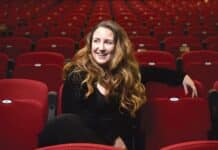Censorship and parental rights are not normally the stuff of comedy. But when the play is by Sharyn Rothstein, a writer known for her comic touch, the shouts of protest are easily turned into gusts of laughter when their absurdity is exposed.
That’s just what happened when Bad Books, Rothstein’s latest opus, was unveiled in a free reading as part of the Bonnie Hammerschlag National Capital New Play Festival two years ago at Round House Theatre. The workshop went on to win a rolling world premiere, starting this month, with full-scale productions at theaters across the U.S.

Of course, it helped to have two of DC’s most talented actors — Kate Eastwood Norris and Holly Twyford — reading the scripts. Happily, the two will reprise their roles in the world premiere, opening this week at Round House. Kimberly Gilbert, a third star in the DC firmament, will be understudying both roles.
Bad Books is the highlight of this year’s Festival, which includes workshop readings of four new plays, whose authors hope to emulate Rothstein’s success.
Having interviewed the playwright before — when her musical adaptation of Hester Street was produced at Theater J last year (click here for my feature in DCTA) — I was eager to catch up with her now. We connected over Zoom.
“This play is literally snatched from today’s headlines,” I said, pointing to the proliferation of book banning, now spreading as fast as the California fires, and the increased parental and state control of what’s taught in the nation’s schools.
Yet the headlines are not new. In fact, as Rothstein pointed out, she actually began writing Bad Books a few years ago, when the issue of parental control first arose.

“There were all these meetings,” she explained. “The town library, the school board, the town council. And I was struck by how these meetings — which you might call protests — were happening all over the country.
“As a writer, I am very wary of censorship. So I wanted to write about it, as seen through the eyes of a badass librarian, one who defies the image of that role.
“And I thought, well, if I’m going to write about a badass librarian, I need to give her a worthy opponent. And this character — a mother who wants a book taken off the shelf at a local library — just came into my head.
“So now I have two women who come into a play with all of their preconceived notions about each other. And over the course of the play, a lot of these notions fall away. The play is meant to be a glimpse of where we are as a country, in terms of books and censorship and parents’ rights, which, by the way, is a term that I find endlessly fascinating.”
“Because you’re a parent?” I asked.
“Yes,” she laughed, “because I am a parent, and I always feel like I don’t know what I’m doing!
“Censorship,” she continued, “has become an increasingly pressing issue. We need to have an honest conversation about what freedom of expression means in this country. But we’re not having that conversation. We’re talking around it. Part of it is because the people who believe in censorship think they’re hearing the word of God.
“It’s the same as it was in the McCarthy era,” she said ruefully, “in that the people railing the most about freedom of speech are also the ones who are trying to curtail it. Those are some of the issues that arise in the play.”
Censorship is not the only topic that is skewered in Bad Books. “But it’s not a political play per se. It’s about a mother and a librarian, people who have to deal with these issues in their community, and they’re doing it for the sake of the kids in their community.”
“What about the comedy in the play?” I asked.
“Comedy is something else that gets lost in all these hyper-political debates,” she explained. “Comedy is what makes people pay attention. Comedy makes us listen to each other, hear each other, and process difficult things with each other. It doesn’t need to be a form of cooperation, but it helps.
“So yes, there’s a lot of humor in the play. And the heart of the play is that it’s not just parents but members of the community who are all trying to do the best they can for the kids.
“The play asks if we’ve overlooked what’s best for our kids. We have all these hyper-charged debates about how we’re protecting them by taking the books off the shelves. To me, it feels like we’re forgetting the kids. We forget that the kids themselves have a voice.”
Knowing that Rothstein and her husband have two children, a 13-year-old son and an 11-year-old daughter, I wondered if the play had grown, at least in part, out of an experience they had had with a school librarian.
“No, it didn’t,” she assured me. “But it did grow out of my experience as a parent. When I was watching the parental rights movement at the beginning, I kept thinking to myself , sometimes jealously, ‘Oh, look at all these parents who know the best thing to do for their kids.’ And I wondered, ‘How can they be so sure?’
“It also comes from wanting our kids to be safe. We all want our kids to be healthy and happy. And I can understand people going to extremes, just trying to safeguard their children.”
She then told me about an incident that took place in Tennessee, when she was there working on a play. One of the actresses was upset because the school her children attended, in Nashville, was being roiled by huge parental protests over mask mandates.
“She was saying that she and her family loved this school, they felt like this was their community, but now they felt like they might need to remove their kids because of the parental outrage. Hearing her anguish over this had a huge impact on me.
“And I was thinking, Oh, it must be so destabilizing to think ‘I live in this town. I love this community, and then all of a sudden, these parents, who I thought I knew, have very different ideas on how to protect our children. And I’m sure that experience went straight into the play.”
Rothstein considers herself fortunate to have landed at Round House. “They gave me a killer workshop,” she said, still awed by the idea that Norris and Twyford had embraced the project. The two actors — both Helen Hayes Award winners — love playing against each other. (In fact, this is their tenth joint project.)
She also feels lucky to have landed Ryan Rilette, who is the artistic director of Round House, as director of Bad Books. “He’s been a stalwart supporter of this play from the very beginning,” she pointed out. But the bottom line is that the Washington audience is receptive.
“DC audiences demand good theater, and they support it too,” she observed.
Although she and her family are normally based in Brooklyn, they moved to LA last August so that Rothstein could work on Suits LA, a prime-time TV series on NBC. The show is a spinoff of the original Suits, for which she was a writer for five years. This time around, she’s both a writer and the co-executive producer.
Like a lot of other playwrights nowadays, she writes for both television and the stage. “They feed each other,” she said. “The more I write for TV, the more I’m hungry for the stage.”
Back to Bad Books: “Should parents bring their kids to this play?” I asked.
“Definitely,” she responded, “but only if they’re high school-age.” The play, she added, deals with adult themes. But teenagers — and their parents — will find it very funny.
Bad Books plays from April 2 to 27, 2025, at Round House Theatre, 4545 East-West Highway, Bethesda, MD (one block from Bethesda Metro station). Tickets ($50–$108) can be purchased by calling 240-644-1100, visiting the box office, or online. (Learn more about special discounts here, accessibility here, and the Free Play program for students here.)
Running Time: Approximately 90 minutes with no intermission.
Cast and creative team credits for Bad Books are here (scroll down).
COVID Safety: Round House Theatre no longer requires that audience members wear masks for most performances. However, masks are required for the performances April 22 and 26 (matinee). Round House’s complete Health and Safety policy is here.
Bad Books
By Sharyn Rothstein
Directed by Ryan Rilette
Featuring Kate Eastwood Norris and Holly Twyford
A National New Play Network Rolling World Premiere
SEE ALSO:
Round House Theatre announces lineup for fourth annual festival of new work (news story, March 5, 2025)



